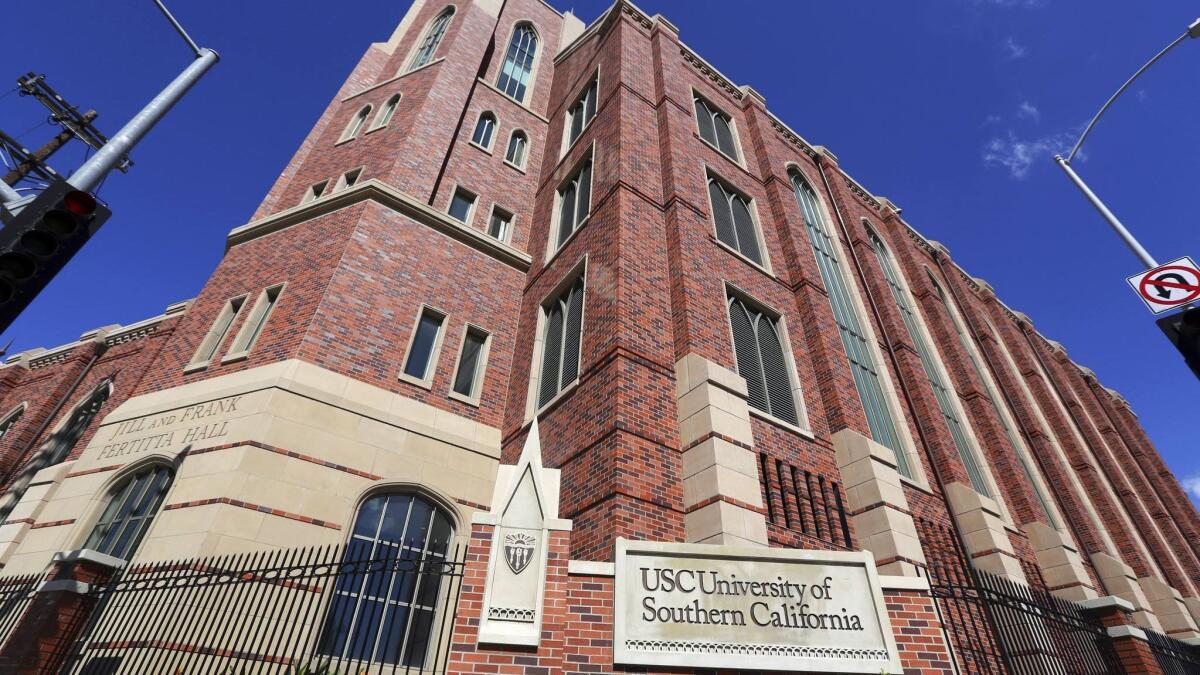Editorial: Sadly, it’s no surprise that USC was at the center of the college admissions scandal

When federal prosecutors revealed a national investigation into fraudulent college admissions, it probably shouldn’t have come as a surprise that USC was at the epicenter of the scheme.
This is, after all, the university rocked in recent years by a series of revelations about scandals and cover-ups, including a medical school dean who partied with criminals and did illegal drugs, a campus gynecologist accused by students of decades of improprieties and a former assistant basketball coach who pleaded guilty to accepting bribes from a sports management firm.
In the latest episode, half of the 32 parents accused by the FBI of breaking the law to get their kids into elite schools had allegedly cheated or bribed their kids’ way to becoming Trojans. Of the dozen coaches and individuals involved in running the scheme, four were current and former USC employees — including Donna Heinel, a senior associate athletic director who allegedly accepted $1.3 million in bribes to get kids into the school as fake recruits for the university’s famed sports programs.
Enter the Fray: First takes on the news of the minute »
USC promptly fired Heinel and the school’s water polo coach, Jovan Vavic, who was also accused of accepting bribes. In a letter to the university, interim President Wanda Austin said the scheme was perpetrated by just a few employees — unbeknownst to senior administrators and admissions employees — and that USC was a victim of their deceit.
Sure, it may prove to be true that no other USC administrators knew that coaches were selling admission to parents wealthy and shameless enough to pass their mediocre progeny off as star athletes. But USC cannot be called blameless. There have been too many examples now of self-dealing, outright corruption and willful ignorance of misconduct to dismiss the latest controversy on campus as the result of a few bad apples.
In earlier scandals, the university let serious complaints go ignored and hid bad behavior, rather than forcing it out into the open. Problem employees were allowed to quietly exit, and the priority was protecting the university’s reputation, rather than fixing the problems.
That’s why USC needs to conduct a full and transparent investigation into how such bribery and corruption could occur in the admissions process. Did no one in the athletic department think something was fishy when a kid with no record of having played football in high school was recruited to play for one of the country’s most renowned college football teams? And if someone did suspect something was awry, were there sufficient outlets for employees to report ethical or criminal violations, and to have those concerns taken seriously?
Austin and Board of Trustees Chairman Rick Caruso have been trying valiantly to change the institutional culture and set USC on a path forward, sometimes in the face of opposition from alumni and donors. Austin gets credit for her work so far, but it would be a mistake to dismiss the college admission fraud as an isolated incident and crime committed upon the university. This is one in a series of scandals that illustrate how much work still needs to be done to reform USC.
Follow the Opinion section on Twitter @latimesopinion and Facebook
More to Read
A cure for the common opinion
Get thought-provoking perspectives with our weekly newsletter.
You may occasionally receive promotional content from the Los Angeles Times.










